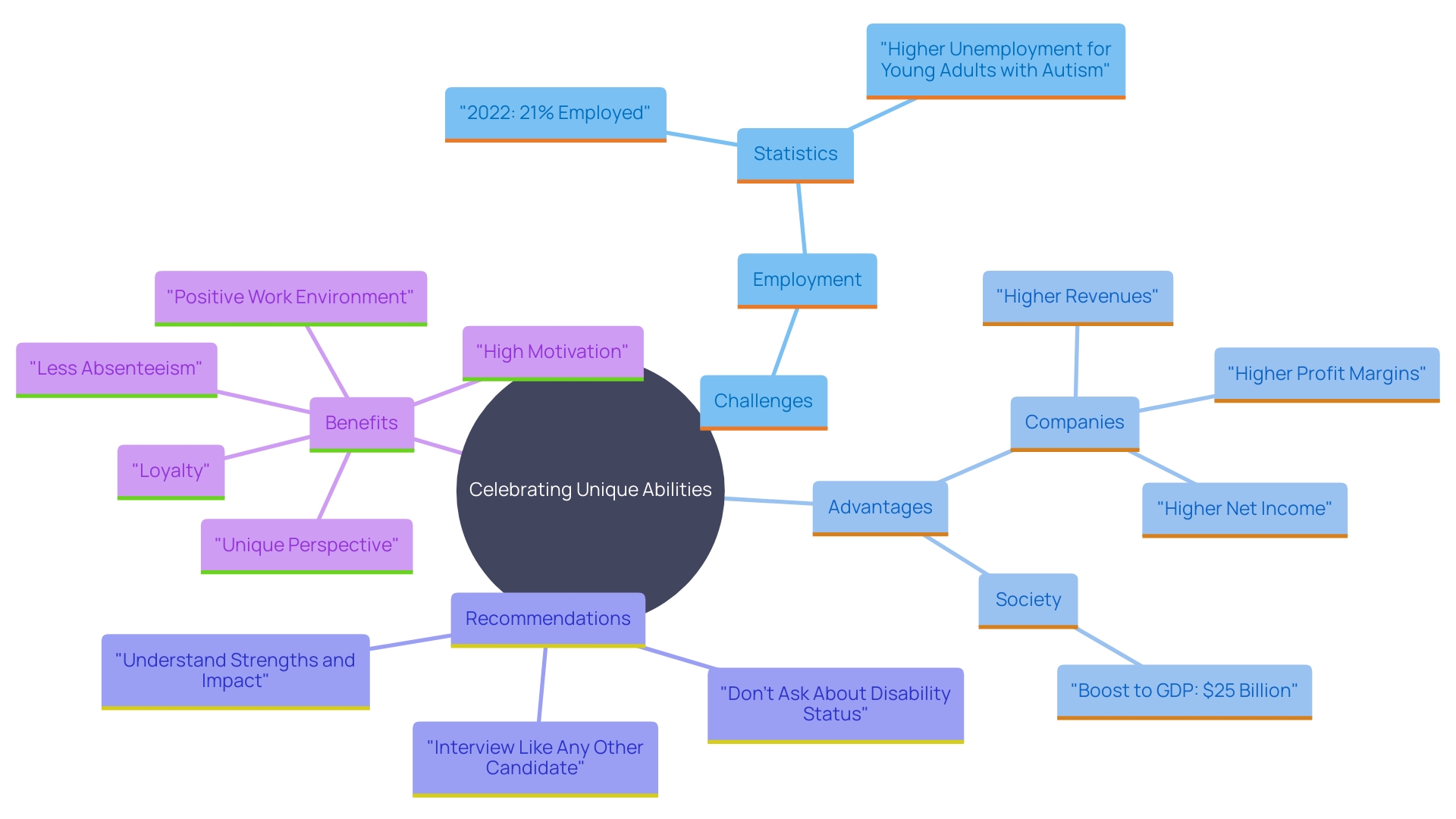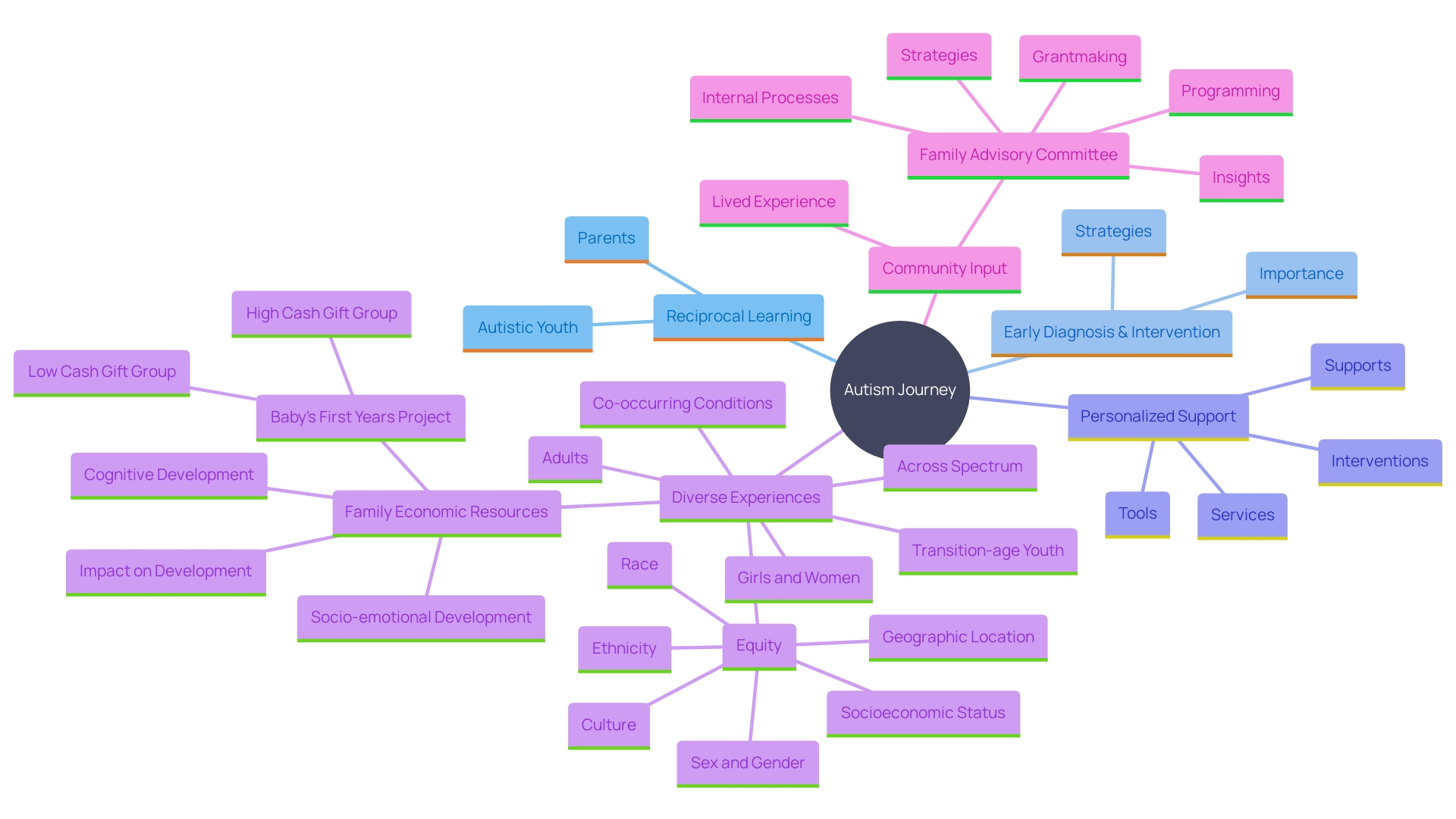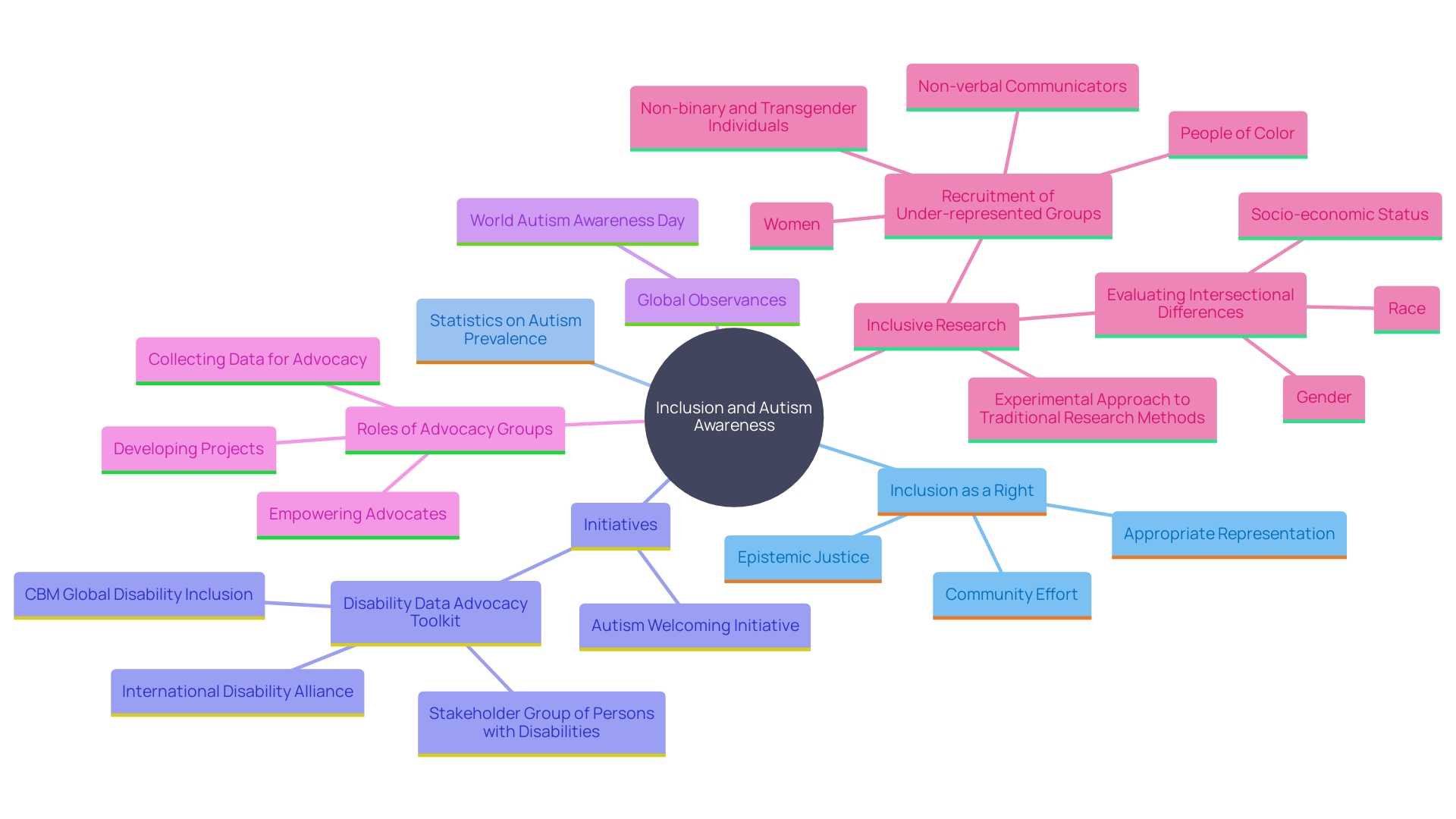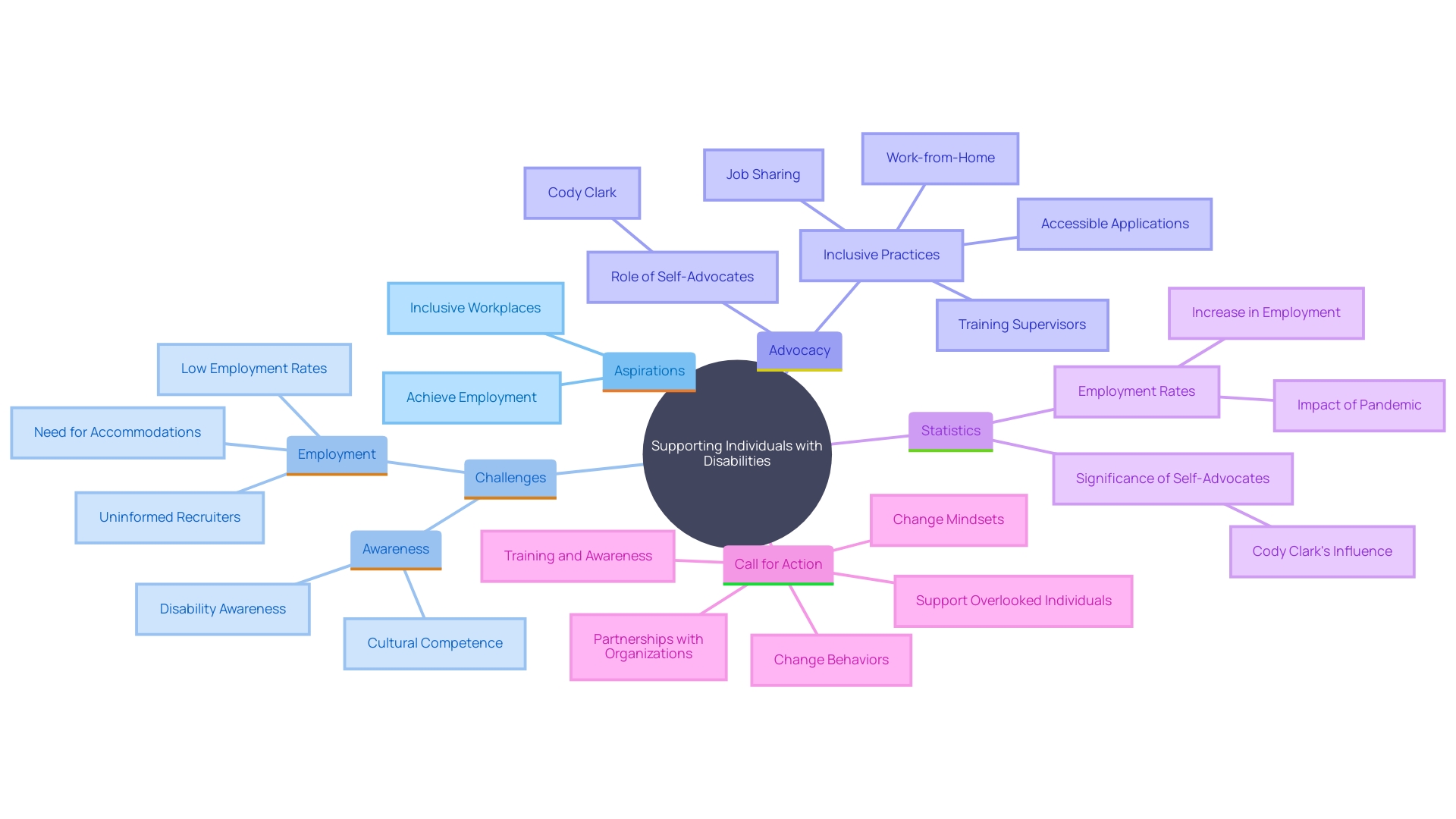Introduction
Celebrating the unique strengths and perspectives of individuals with autism not only enriches our communities but also underscores the importance of fostering inclusive environments. Despite the challenges they face, especially in employment sectors, their contributions are invaluable. With only 21% of people with disabilities, including autism, employed in 2022, there is a clear need to bridge this gap.
Inclusive employment is not just a moral imperative but also an economic advantage, as companies that embrace diversity tend to perform better financially. Highlighting stories of success, such as Cody Clark’s entrepreneurial venture, Cody Clark Magic, demonstrates the potential and ingenuity that individuals with autism bring to the table. By acknowledging and valuing these unique perspectives, society can create a more inclusive and supportive environment for all.
Celebrating Differences: Quotes on Autism Pride
“This condition is not a disability, it's a different ability.” This powerful reminder encourages us to celebrate the unique strengths and perspectives that individuals with this condition bring to our world. Despite the significant challenges they face, especially in employment sectors, their contributions are invaluable. In 2022, only 21% of individuals with disabilities, including developmental disorders, were employed, highlighting a persistent gap in the job market. This is a stark reminder that we need to foster more inclusive environments. More than half of young adults with developmental disorders experience unemployment or are not participating in higher education within the two years after high school, in contrast to their peers with different disabilities. Inclusive employment is not just a moral imperative but also a sound economic investment. Companies that actively seek to employ people with disabilities have higher revenues, net income, and profit margins. Cody Clark, an autistic self-advocate, is a shining example of how embracing diverse abilities can lead to success. 'His venture, Cody Clark Magic, showcases the potential and creativity that people with neurodiverse traits can bring to the table.'. By acknowledging and valuing these unique perspectives, we not only support the individuals but also enrich our communities and workplaces.

A Parent’s Perspective: Quotes on Autism and Family
"Each day I observe the world through my offspring's perspective, and it prompts me to value the beauty in various ways of thinking." This quote encapsulates the profound lessons families encounter on their autism journey. Connecting profoundly with the distinct viewpoints of neurodivergent youth can uncover surprising understandings and appreciation in diversity. As Linda Poindexter aptly stated, “Autism is relationship-building. The irony of a parent and offspring relationship is that at any given moment, you never know who is teaching whom. These interactions are reciprocal, with young ones often teaching their parents as much as they learn from them.
Research highlights the significance of these connections, demonstrating that successful participation in everyday tasks and social exchanges greatly influences the well-being of individuals on the spectrum. According to a study published in Pediatrics, early diagnosis and intervention are crucial, especially in families with limited access to care. This is supported by findings that up to 70% of autistic youth struggle with challenges such as anxiety and mood difficulties, which can cascade across various settings from early years to adulthood.
The need for personalized support is paramount, as highlighted by the IACC Strategic Plan Update, which emphasizes the diverse experiences and challenges across the spectrum. Autistic individuals and their families have called for a range of tailored tools and services, moving beyond a one-size-fits-all approach. This method is reinforced in materials such as "Parenting at the Intersections," which honors the experiences of neurodivergent youth of color, offering a nurturing environment for families to contemplate their journeys.
In essence, viewing the world through the perspective of an autistic individual not only fosters a deeper appreciation for different ways of thinking but also underscores the importance of tailored support and the reciprocal nature of learning and growth within families.

Understanding Autism: Quotes on Acceptance and Inclusion
“Inclusion is not a privilege, it’s a right. Together, we can create a world where everyone belongs.” This powerful statement underscores the necessity of fostering acceptance and celebrating each person’s individuality. The Centers for Disease Control and Prevention (CDC) discloses that this developmental disorder impacts roughly 1 in 36 youth and an estimated 2.2% of adults in the United States. Despite these numbers, many people with autism face significant challenges, from navigating social interactions to dealing with sensory sensitivities.
Pamela McKillop, co-director of Autism Alliance of MetroWest, emphasizes the significance of establishing inclusive environments: "People are really hesitant to bring their kids into the community because they're worried about being judged by their child's behavior." The Autism Welcoming Initiative launched by MetroWest aims to alleviate this anxiety by certifying businesses as friendly toward those on the spectrum, thus fostering an atmosphere where those with autism feel understood and accepted.
Moreover, the journey towards acceptance is gaining momentum globally. For instance, the United Nations' 2024 observance of World Autism Awareness Day will feature autistic voices from various regions, emphasizing the importance of inclusivity and the implementation of Sustainable Development Goals (SDGs) to enable autistic people to thrive.
Advocates such as the Autism Society emphasize that acceptance goes beyond awareness; it’s about ensuring that everyone in the community has access to the support they need. This shift towards acceptance over mere awareness is crucial in promoting a society that values neurodiversity and individual differences. As Chris McDougle, director of Massachusetts General Hospital’s Lurie Center for Autism, points out, navigating daily life can be overwhelming for those with developmental disorders due to unpredictable interactions and sensory overload. By fostering a culture of acceptance, we can diminish these anxieties and create a world where everyone truly belongs.

Finding Strength: Quotes on Resilience and Self-Acceptance
"The greatest gift you can give your offspring is the belief in their potential." This quote serves as a powerful reminder of the importance of nurturing self-acceptance and resilience in our young ones. Research shows that optimistic parenting fosters resilience, a critical factor in long-term success and well-being. Dr. Dawn Adams, leading a new project aimed at assisting families in navigating the journey following a diagnosis, emphasizes the need for evidence-based support to help parents better understand their autistic children.
Additionally, honoring the distinct abilities and strengths of people on the spectrum, such as creativity and problem-solving, can greatly diminish stigma and enhance social inclusion. As Dr. Edwin Burns from Swansea University highlights, society must shift its perspective to acknowledge the diverse abilities of those with neurodevelopmental conditions. This approach not only builds resilience but also fosters a sense of community and support among families and advocates.
Inspiring Hope: Quotes from People with Autism
“I am not my diagnosis. 'I am a person with dreams and aspirations.' This powerful statement from someone on the spectrum serves as a poignant reminder of the importance of recognizing and supporting the ambitions of those with diverse abilities. 'Cody Clark, a self-advocate and founder of Cody Clark Magic, exemplifies this through his work, demonstrating that people with developmental differences can thrive when given the opportunity.'. Regardless of the abilities and aspirations numerous persons with disabilities have, finding work continues to be a major difficulty, with merely 21% of those with disabilities, including those on the spectrum, employed in 2022. This gap underscores the need for inclusive employment practices. As Keith Wargo, President and CEO of Autism Speaks, states, “Small, but meaningful steps taken by employers can make a significant difference.” By supporting the aspirations of individuals with autism and other disabilities, we can foster a more inclusive and empowered society.

Empowering Parents: Quotes from Autism Moms
"As a mom, my mission is to advocate for my offspring, to ensure they are seen, heard, and valued in every space they enter." This powerful sentiment reflects the unwavering commitment parents have for their offspring’s well-being. This commitment is particularly vital for guardians of individuals on the spectrum, who frequently encounter various obstacles in obtaining the essential assistance and resources. Research has demonstrated that a lack of access to trained professionals and early interventions can significantly affect the life outcomes of individuals with autism.
One poignant example is Mary Gachoki, who, despite living in an informal settlement on Nairobi's outskirts, tirelessly sought a diagnosis for her son at the Kenya Institute of Special Education. The struggle didn't end there; securing therapeutic services came with its own set of hurdles.
Studies involving guardians of children with autism highlight the significance of a strength-focused strategy instead of a deficit-focused one. This perspective shift can help dismantle the systemic barriers that place families at a disadvantage. As neurodiversity advocate Jan Stewart aptly puts it, "While it can be overwhelming to identify the right support for your offspring, it's important to be persistent until you find the answers you are looking for.". Don't forget: there is help, hope, and you are not alone."
The commitment of these parents, often coupled with their own experiences of being autistic, highlights the importance of understanding and representing their unique challenges and strengths. The broader autism community continues to advocate for better support systems, ensuring each child is not only seen and heard but celebrated for who they are."
Conclusion
Celebrating the unique strengths of individuals with autism is essential for building an inclusive society. With only 21% of people with disabilities, including autism, employed in 2022, there is a critical need for inclusive employment practices. Success stories like Cody Clark’s highlight how diverse perspectives can enrich communities.
Family experiences in navigating autism emphasize the importance of mutual learning between parents and children. Research shows that personalized support and early intervention are vital, particularly for those facing significant challenges. Tailored resources are necessary to address the diverse needs of autistic individuals, ensuring that every child receives the care they deserve.
Fostering acceptance and inclusion is a collective responsibility. Creating autism-friendly environments helps reduce stigma and anxiety, enabling families to engage more fully in their communities. Transitioning from awareness to genuine acceptance is crucial for breaking down barriers that limit the potential of individuals with autism.
Empowering parents to advocate for their children strengthens the broader autism community. Through dedicated advocacy and a commitment to understanding, a more inclusive and supportive environment can be achieved, ensuring every individual is recognized, valued, and celebrated for their unique contributions.




